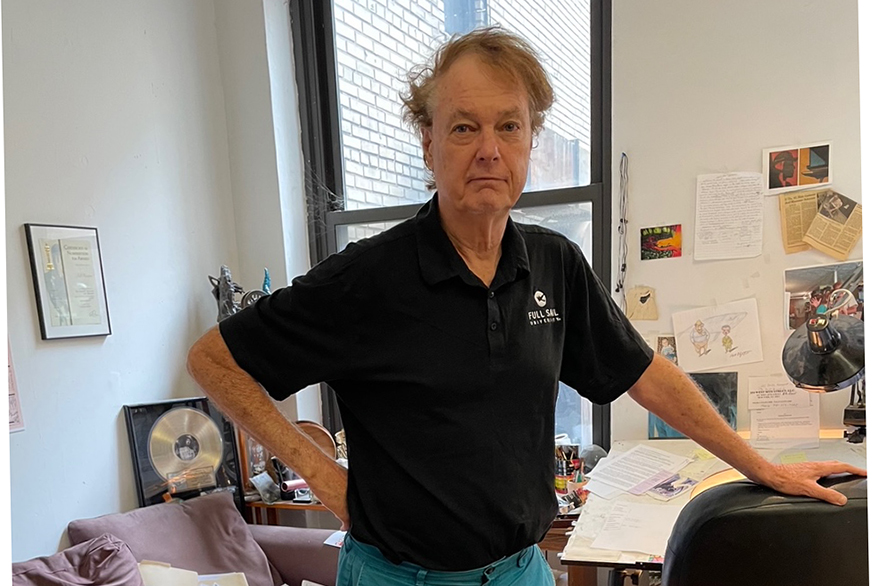
Bill Plympton, 78, is an icon in indie animation.An Oregon native, he moved to New York City in 1968, majoring in cartooning at the School of Visual Arts.He was an illustrator and cartoonist for 15 years, until his career as an animator took off in the 80s.
His features and shorts have won many festival awards and two academy award nominations for short animation.Senior Planet spoke to Plympton in his studio in Chelsea in lower Manhattan.SP: Can you talk about starting out and breaking into the industryBP: Things took off after my first film Your Face had a screening in New York City in 1987 with professional animators.My life changed rapidly after that.
It was a nothing film, but for some reason, people went nuts.I heard everybody laughing, and I got the live audience reaction.I never got that with print cartoons, even though I worked for really big people: the New York Times, Playboy, Rolling Stone, National Lampoon.
Then I said thats it.Im quitting print and Im going into animation.SP: What do you think was the films appeal?BP: It had unique humor, deadpan Monty Python humor.I spent around $2,000 to make it but after people saw Your Face I got commercial work for a lot of money.
It changed my life.SP: Your commercial spots appeared a lot on MTV, including 25 Ways to Quit Smoking (1989).Its very funny but it addresses an important topic.BP: Yes, it had a message.SP: After your shorts got attention, you started thinking about making a full length film, a childhood dream.That became The Tune, (1992) which debuted at the Sundance Film Festival.
You drew 40,000 drawings.You said your hand needed a rest.Why do you still work by hand?BP: I enjoy drawing and why should I pay someone else when I can do it better? An assistant edits the work on a computer but I direct the editing.SP: Can you talk about your Master Class.?BP: I do this class once or twice a month.
I just got back from France.Besides teaching in the states, I also teach in Canada and Mexico.I talk about being an independent filmmaker, about crowdfunding.
It costs about $200,000 to make a feature that is 70 or 80 minutes long.Im lucky I still have money coming in from Your Face and The Tune.During the class, I explain Plymptons dogma, the three rules.Rule number one: make your film short, like 4-5 minutes.
Rule number two: make it cheap.Do as much as you can yourself to keep the budget low.Rule number three: make your film funny.SP: In terms of funding your own work, is that to insure independence? Your fans kicked in over $100,000 for your film Cheatin (2013).BP: Yes, I dont want people looking over my shoulder.
Im the final arbiter.SP: Who or what are your formative influences on your unique style?BP: Winsor McCay made brilliant animated films in the 1910s-1920s.He was way ahead of his time.Disney was a big influence, Tex Avery who did Bugs Bunny and Chuck Jones who did Road Runner.SP: You recently collaborated with other artists on an animation for Weird Al Yankovic.
What was that like?BP: Al is a big fan and he was easy to work with because his films are so funny.Ive done three music videos for Al.SP: Your subject matter is wild and crazy: astronaut returning to earth after 20 years Mutant Aliens (2002); two murdered teens returning to the prom to get revenge Hair High (2004).This sounds like John Waters meets Stephen King.
Where do you get these ideas?BP: I do lots of genre stuff, like high school horror, western, noir.I love watching movies from the 30s and 40s.SP: What are you working on now?BP: My newest feature is Slide, coming out in 2025.Its a Western, a dark and musical comedy about a mythical cowboy who saves a corrupt lumberjack town from its evil twin mayors with his slide guitar.I work with two friends who compose the music for my films: Maureen McElheron sings and writes the lyrics and Hank Bones plays guitar.
I tell them where we need music.Heres a peek at the Slide Trailer:SP: You are very prolific, very productive.BP: Nobody has made as many films by themselves.I have made nine animated features, four live actions and hundreds of shorts.SP: What does aging with attitude mean to you?BP: To me, aging with attitude- its not a negative description- its positive.It means one has principles and one lets them guide their lifeKate Walter is the author of two memoirs:Behind the Mask: Living Alone in the Epicenter;andLookingfor a Kiss: A Chronicle of Downtown Heartbreak and Healing.Her essays and opinion pieces have appeared inThe New York Times, Newsday,New York Daily News, AM-NY, Next Avenue, The Advocate,The Village Sun and other outlets.She taught writing at CUNY and NYU for three decades and now works as a writing coach.Photo of Kate Walter by Su ZenBanner Photo of Bill Plympton by Kate WalkerOther art, video and photos courtesy of Bill Plympton
Disclaimer: This story is auto-aggregated by a computer program and has not been created or edited by Senior Savings Deals.
Publisher: Senior Planet ( Read More )
Publisher: Senior Planet ( Read More )

